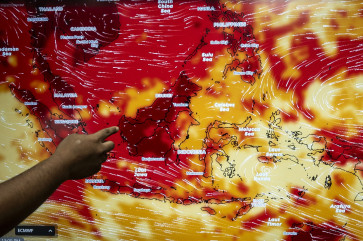Editorial: Elites vs the people
The eliteâs betrayal of reformasi is visible through its âstructured, systematic and massiveâ efforts to pass a regional election bill that will allow it to seize back sovereignty from the people in electing regional leaders
Change Size

T
he elite's betrayal of reformasi is visible through its 'structured, systematic and massive' efforts to pass a regional election bill that will allow it to seize back sovereignty from the people in electing regional leaders.
But for the coalition of parties that supported the losing presidential candidate pair of Prabowo Subianto and Hatta Rajasa, the country's indirect regional electoral system gave them a well-deserved equalizer after the Constitutional Court flatly rejected their claim last month about 'structured, systematic and massive' fraud in the presidential election and, thus, upheld the victory of Joko Widodo and his running mate, Jusuf Kalla.
The Red-and-White Coalition alliance of the Gerindra Party, the Democratic Party, the Golkar Party, the National Mandate Party (PAN), the United Development Party (PPP) and the Prosperous Justice Party (PKS) holds 420 of the 560 total seats in the House of Representatives and will outvote the rival coalition in passing the bill if no compromise is achieved.
They may call it the art of politics, setting out to teach a lesson to the opposing camp, which remains euphoric looking ahead to the inauguration of Jokowi and Kalla on Oct. 20. But what use is a law if it strips away at democracy?
Surely it will be the elite that will benefit from the regional election law. Regional leaders will fall under the control of party bosses and be obligated to serve their interests without having to attend to people's aspirations. It will be a déjà vu of the New Order era.
Supporters of indirect regional elections have expressed their concern about vote-buying practices in direct elections; but reinstating the old mechanism will only revive bribery by those who are out to win the votes of legislative council members. Direct regional elections were introduced in 2005 to minimize vote-buying, albeit ineffectively due to weak law enforcement. The existing law, for example, does not require the disqualification of candidates found guilty of buying votes.
High-cost politics is another justification for repealing direct elections, although in fact it is the political elites themselves that create extra expenditure, both in building the image of their candidates and in securing party endorsements.
Political parties do not have to spend too much if they nominate figures with proven track records, as evident from numerous past regional elections. It is crucial that improvements be made in the recruitment and regeneration of political party members seeking public posts.
Communal conflicts have indeed marred direct regional elections as the Red-and-White Coalition has claimed, but this argument alone is insufficient to restore indirect elections. Most of the direct regional elections held since 2005 have passed off peacefully. It was, in fact, losing political elites who incited hatred and fueled conflicts or, at the very least, failed to control their supporters.
One can easily find imperfections in direct regional elections, but that does not mean the democratic way of electing leaders has failed; nor does it mean that leadership choices should be re-entrusted to political parties or, more precisely, power-hungry oligarchs.









